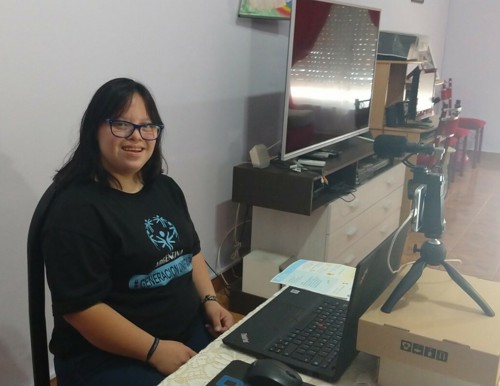When Grace, a Special Olympics athlete and global youth leader from New Zealand, heard that a friend of hers had to miss a long-awaited competition due to transportation issues, her response was to help build an app that ensured other athletes wouldn’t run into similar problems. She teamed up with fellow global youth leader Jack, and then the duo got to work on their project designed to connect Special Olympics athletes with transportation. And, when COVID-19 threatened to stall the project’s momentum, the pair quickly turned to Microsoft Teams to collaborate and continue developing their app, making sure their inclusive initiative didn’t miss a beat.
Special Olympics has a 50-year history of championing inclusion through sport, providing year-round athletic training and hosting sports competitions for people with intellectual disabilities. Across 200 countries on every continent, the organization’s network of more than 1 million volunteers works tirelessly to build a more inclusive world. At the forefront of this movement, Special Olympics Global Youth Leaders with and without intellectual disabilities are bringing the vision of an inclusive world to life in their schools and communities. Global youth leaders like Grace and Jack make up the global group of dynamic change agents. Today, these young advocates use Microsoft Teams to connect with their peers and help shape the future of their communities.
“Special Olympics is a movement that focuses on bringing people together,” says Kaitlyn Hamrick, Senior Manager for the Global Youth Program at Special Olympics. “Our global youth leaders are empowered to connect with their peers from around the globe and drive change in their communities, and many of them use Microsoft Teams to do just that.”
Global youth leadership initiatives thrive in Teams
Global youth leaders from around the world are empowered to organize projects that raise awareness of the Special Olympics mission of inclusivity. Communities across the globe benefit from the social impact these global youth leaders create through their initiatives that are supported by the connections happening in Teams. At Special Olympics Albania, global youth leaders Ina and Agjellos used Teams as a collaboration hub so they could work together to increase Special Olympics Unified Champion Schools® programming across the country, which aims to give young people the tools and training they need to build environments of inclusion. Ina and Agjellos’s initiative worked to bring about systemic change and create a climate of inclusivity through the foundation of sports. These global youth leaders brought five schools together in Teams to teach best practices on promoting inclusion and healthy lifestyles through sports while helping shape education in Albania.
Grace and Jack, the global youth leaders from Special Olympics New Zealand who collaborated in Teams to help develop a transportation app, see digital tools as a key part of supporting Special Olympics athletes. “Our app helps Special Olympics athletes feel included because it brings them closer together,” says Jack. “It means they don’t have to be at home by themselves. It means they don’t have to rely on friends and family members to take them places that is out of their way.” Working together to make their project a reality in spite of the unexpected challenges brought on by COVID-19 is an achievement in itself. “What I’ve learned about myself while working on this project is that I can keep positive and determined throughout the difficulties we may face,” says Grace. Ultimately, Jack and Grace used Teams to create a valuable resource for their fellow Special Olympics athletes in spite of the added challenge of COVID-19. “Teams allows us to still work together when we can’t be together,” says Jack. “It’s been amazing still being able to move forward and work on our project ….”
Similarly, global youth leaders from Special Olympics Argentina used Teams to engage with fellow global youth leaders safely while complying with COVID-19 restrictions. Global youth leaders Catalina and Cintia use the Teams app to host biweekly meetings designed to keep participants motivated and healthy during the pandemic. “Many [Special Olympics] athletes were feeling sad or lonely because of the quarantine,” says Catalina. With their project, dubbed “Closer than Ever,” Catalina and Cintia hope to recruit 100 new global youth leaders and provide participants with a sense of community and support in an isolating time. “It’s very important to take care of [Special Olympics] athletes’ physical and mental health,” says Cintia. By using Teams as a digital meeting place to share their passion for inclusion, healthy living, and leadership, Catalina and Cintia have worked together to bring their community closer. “The best thing about being a [global] youth leader is that we are always learning about inclusion,” says Catalina. “We have a duty to bring all this information to society, to teach and pass everything we know.”

Global collaboration helps a movement gain momentum
For Special Olympics, global collaboration is nothing new, but the way global youth leaders from across the world work together has transformed along with their new digital tools. Today, digital collaboration tools help supplement the in-person meetings Special Olympics has hosted for much of its history. Teams stood out as a fit for the global youth leadership program in part because it could help connect a geographically dispersed network of global youth leaders across a wide variety of languages and technological circumstances. Now, global youth leaders can use Teams to collaborate and build their initiatives in an inclusive and highly secure digital space. From video meetings to chat to file sharing, participants in different time zones can always find a way to contribute to the discussion. “Global youth leaders from around the world are using Teams to build community,” says Hamrick.
For global youth leader Catalina from Special Olympics Argentina, her involvement with the organization created a sense of purpose and a fresh outlook. “Special Olympics changed my life, because it gave me a new perspective, a new way of seeing the world, which is through the eyes of inclusion.” For Cintia, a fellow global youth leader from Special Olympics Argentina, inclusion boils down to mutual respect. “For me, inclusion means all people with and without disabilities can live together and respect each other,” she says. By using Teams, global youth leaders like Cintia and Catalina are finding new ways to share their perspectives and create change.
Creating change in communities around the world
Special Olympics is devoted to creating connections and uniting individuals from different walks of life to create a more inclusive world. For Special Olympics Global Youth Leaders, Teams aligns with the program’s values and supports modern, dynamic ways of working across a global network. At its core, Special Olympics is a movement based on empowering individuals to create change in their communities. “Special Olympics owes its success over the last 50 years to individuals who stand up for inclusion,” says Hamrick. “Today, our community of global youth leaders are connecting with their peers across the globe who share a commitment to change.” Using Teams, Special Olympics Global Youth Leaders are working hard to make the world a more inclusive place.






